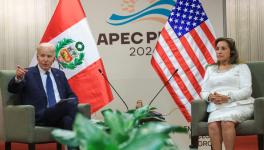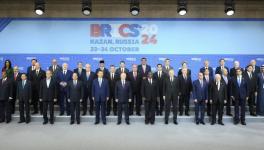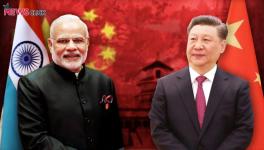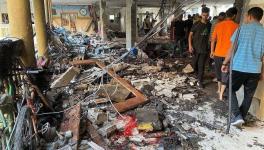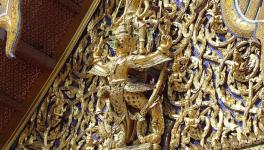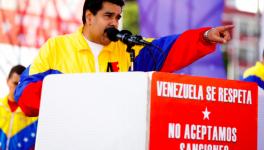Inter-Korea Peace Engagement Dampens US’s Bellicosity
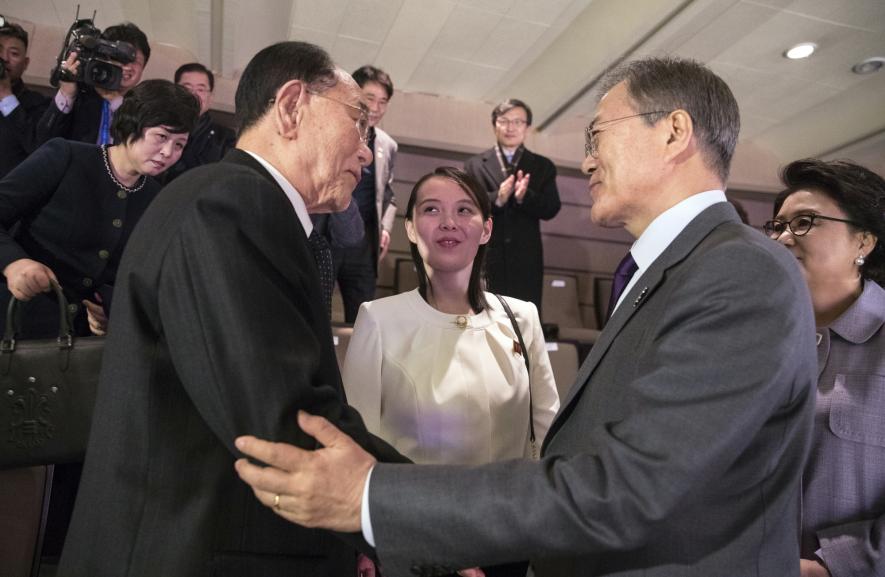
Image Courtesy: Yonhap/IANS
North and South Korea are heading towards further engagement on the peace process as Pyeongchang Winter Olympics eased the tension between the two countries. The positive developments in the region even forced the Washington to ‘slightly re-align’ its aggressive posture towards the North. As North Korea praised the South for its warm reception during the games, South Korean President Moon Jae In has rejected the call by Japanese Prime Minister Shinzo Abe for the resumption of joint military drills with the United States.
Sources said that, in response to Abe’s request, Moon said it was a matter of South Korea's sovereignty and its domestic affairs, noting it would not be appropriate for Abe to directly mention the issue.
In his flight back to Washington, US Vice President Mike Pence said that US is ready for talks with ‘if North Korea wants”. Pence said that the aim is to put maximum pressure and engage at the same time, and position is ultimately to move towards denuclearization of the North.
Though Pence and others in Washington may refuse to accept ‘toning down’ of its aggressive stance against peace process with the North, it seems that the recent positive engagement between the two Koreas has put a roadblock to President Donald Trump’s bellicose drive.
Trump administration had maintained that it would not talk with North Korea until its precondition of Pyongyang stopping its nuclear program is agreed.
US envoy to UN, Nikki Haley, had earlier questioned the wisdom of an inter-Korean dialogue. “North Korea can talk with anyone they want, but the US is not going to recognize it or acknowledge it until they agree to ban the nuclear weapons that they have,” Haley told reporters.
As the ‘double freeze policy’, long proposed by Russia and China comes into to play -even though temporary – the prospects of a peaceful resolution have been raised. The double freeze policy, also known as double suspension, involves freezing missile launches in North Korea and South Korea’s military drills with the US.
North Korea had maintained that its missile launches are a defensive deterrence action to the provocative military drills conducted by the South Korea and US.
The Winter Olympics, apart from the unified march by the delegates of two Koreas has witnessed personal invitation to Moon by North Korean leader Kim Jong-un, who had sent letter through his sister, Kim Yo-jong. Also, Moon had hosted a lunch for the North Korean delegation. But during the games, Pence refused to interact with North Korean delegation.
Attending the luncheon were Kim Yo-jong, Kim Jong-un's sister who serves as the first vice director of the Central Committee of the ruling Workers' Party of Korea and Kim Yong-nam, president of the Presidium of the Supreme Peoples Assembly who is leading the ranking delegation.
Meanwhile, international Olympic Committee (IOC) President Thomas Bach told the South and the North Korean players on the joint women's ice hockey team that they should be proud despite the big loss to Switzerland in the opening game, his spokesman said on Sunday.
"It was a good symbol of hopefully what the Olympic Games and the Olympic spirit can do," IOC spokesman Mark Adams said of Saturday's hockey game.
(with inputs from IANS)
Get the latest reports & analysis with people's perspective on Protests, movements & deep analytical videos, discussions of the current affairs in your Telegram app. Subscribe to NewsClick's Telegram channel & get Real-Time updates on stories, as they get published on our website.









